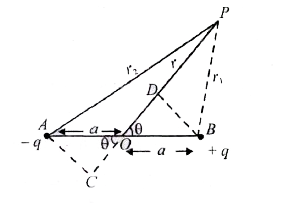Derive an expression for electric potential at a point due to electric dipole. Also find its value on (i) axial line (ii) equatorial line.
Consider an electric dipole AB consisting of two charges -q and +q. Let P be the point where we have to calculate the electric potential and O be the centre of dipole.
Let , and .
Let and .
The potential at point P due to charge is given by
.........(i)
The potential at point P due to -q charge is given by
or ...........(ii)
According to superposition principle the net potential at point P is given by
or [using equations (i) and (ii)]
or ............(iii)
Now draw AC perpendicular to extended segment of PO and BD perpendicular to PO as shown in the figure.

In ,
In ,
Now ...........(iv)
.................(v)
Using equations (iv) and (v) , equation (iii) becomes
or
or ..........(vi)
(i) Axial Line : When point P is on axial line , then .
So equation (vi) becomes
(ii) Equatorial Line : When point P is on equatorial line, then , so equation (vi) becomes
So electric potential on equatorial line is zero.
Similar Questions
What is an electric dipole and electric dipole moment? Derive an expression for electric potential at any point due to an electric dipole. Also discuss the special cases.
View SolutionDerive an expression for the electric potential at any point along the axial line of an electric dipole.
View Solution
Knowledge Check
- Question 1 - Select One
The electric potential at a point on the equatorial line of a electric dipole is
Adirectly proportional to the square of the distanceBindirectly proportional to the square of the distanceCdirectly proportional to the chargeDnone of the above
Derive the expression for the electric potential at any point along the axial line of an electric dipole.
View SolutionDerive the expression for the electric potential at any point along the axial line of an electric dipole.
View Solution(i) Derive the expression for the specific for the electric potential due to an electric dipole at a point on its axial line.
(ii) Depiet the equivpotential surfaces due to an electric dipole.View SolutionDerive the expression for the electric potential at any point along the axial line of an electric dipole.
View SolutionDeive an expression for the electric field at any point on the equatorial line of an electric dipole.
View SolutionDerive an expression for the electric field at any point along the axial line of an electrical dipole.
View SolutionWhat is the angle between the directions of electric field due to an electric dipole and its dipole moment at any :
(i) Axial p oint . (ii) Equatorial point .View Solution

